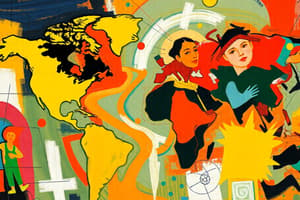Podcast
Questions and Answers
What is the primary concept behind idealism and reformism in international relations?
What is the primary concept behind idealism and reformism in international relations?
Present-day institutional liberals maintain which of the following views regarding international institutions?
Present-day institutional liberals maintain which of the following views regarding international institutions?
What distinguishes international organizations from international regimes?
What distinguishes international organizations from international regimes?
Which of the following best describes the essence of utopian liberalism?
Which of the following best describes the essence of utopian liberalism?
Signup and view all the answers
What role do international institutions play in facilitating cooperation among nations?
What role do international institutions play in facilitating cooperation among nations?
Signup and view all the answers
What is the ultimate goal of transforming power politics according to the idealist perspective?
What is the ultimate goal of transforming power politics according to the idealist perspective?
Signup and view all the answers
Why might powerful nations resist cooperation in international systems?
Why might powerful nations resist cooperation in international systems?
Signup and view all the answers
What factors do present-day institutional liberals believe are crucial for meaningful cooperation?
What factors do present-day institutional liberals believe are crucial for meaningful cooperation?
Signup and view all the answers
What is the definition of international actors according to the content?
What is the definition of international actors according to the content?
Signup and view all the answers
Which of the following statements about transnational relations is true?
Which of the following statements about transnational relations is true?
Signup and view all the answers
Which group is NOT typically classified as a non-state actor?
Which group is NOT typically classified as a non-state actor?
Signup and view all the answers
What is a key characteristic of non-state actors in international relations?
What is a key characteristic of non-state actors in international relations?
Signup and view all the answers
Which statement best describes the category of hybrid actors?
Which statement best describes the category of hybrid actors?
Signup and view all the answers
Which of the following is NOT a major group of non-state actors mentioned?
Which of the following is NOT a major group of non-state actors mentioned?
Signup and view all the answers
Why might NGOs be unhappy with being classified as non-state actors?
Why might NGOs be unhappy with being classified as non-state actors?
Signup and view all the answers
Which definition fits non-state actors within the context of international relations?
Which definition fits non-state actors within the context of international relations?
Signup and view all the answers
What is the primary function of international regimes in international relations?
What is the primary function of international regimes in international relations?
Signup and view all the answers
Which article of the UN Charter emphasizes the maintenance of international peace and security?
Which article of the UN Charter emphasizes the maintenance of international peace and security?
Signup and view all the answers
Which theory suggests that democratic nations are less likely to go to war with each other?
Which theory suggests that democratic nations are less likely to go to war with each other?
Signup and view all the answers
What major historical events initiated the first wave of democratic peace theory?
What major historical events initiated the first wave of democratic peace theory?
Signup and view all the answers
What does the concept of absolute gains imply in international relations?
What does the concept of absolute gains imply in international relations?
Signup and view all the answers
What significant pattern has Michael Doyle observed regarding the relationship between democracies and interstate wars?
What significant pattern has Michael Doyle observed regarding the relationship between democracies and interstate wars?
Signup and view all the answers
What does the discussion surrounding the National Security Council highlight?
What does the discussion surrounding the National Security Council highlight?
Signup and view all the answers
What illustrates the idea of relative gains in an economic context?
What illustrates the idea of relative gains in an economic context?
Signup and view all the answers
What is a major criticism against the concept of democratic peace theory?
What is a major criticism against the concept of democratic peace theory?
Signup and view all the answers
What is a central point regarding cooperation among states as mentioned in the context of barriers to communication?
What is a central point regarding cooperation among states as mentioned in the context of barriers to communication?
Signup and view all the answers
What significant global trend began in the 1970s regarding democracies?
What significant global trend began in the 1970s regarding democracies?
Signup and view all the answers
What principle does the Non-Proliferation Treaty (NPT) primarily focus on?
What principle does the Non-Proliferation Treaty (NPT) primarily focus on?
Signup and view all the answers
Which organization is responsible for supervising the implementation of the Non-Proliferation Treaty?
Which organization is responsible for supervising the implementation of the Non-Proliferation Treaty?
Signup and view all the answers
What does horizontal proliferation address according to the Non-Proliferation Treaty?
What does horizontal proliferation address according to the Non-Proliferation Treaty?
Signup and view all the answers
How does imitation play a role in state interactions in international relations?
How does imitation play a role in state interactions in international relations?
Signup and view all the answers
What outcome was decided upon during the conference held in May 1995 regarding the Non-Proliferation Treaty?
What outcome was decided upon during the conference held in May 1995 regarding the Non-Proliferation Treaty?
Signup and view all the answers
According to neo-liberals, what best explains why states may choose to cooperate?
According to neo-liberals, what best explains why states may choose to cooperate?
Signup and view all the answers
What role do international regimes and organizations play according to neo-liberal perspectives?
What role do international regimes and organizations play according to neo-liberal perspectives?
Signup and view all the answers
Why do states often hesitate to cooperate, as noted by neo-liberal theorists?
Why do states often hesitate to cooperate, as noted by neo-liberal theorists?
Signup and view all the answers
How does cooperation affect the predictability of state behavior in international relations?
How does cooperation affect the predictability of state behavior in international relations?
Signup and view all the answers
What outcome does cooperation lead to in terms of state security?
What outcome does cooperation lead to in terms of state security?
Signup and view all the answers
What mechanism allows states to have positive expectations from repeated cooperation?
What mechanism allows states to have positive expectations from repeated cooperation?
Signup and view all the answers
What do neo-liberals believe is a core characteristic of effective international regimes?
What do neo-liberals believe is a core characteristic of effective international regimes?
Signup and view all the answers
What defines a non-governmental organization (NGO) according to the UN?
What defines a non-governmental organization (NGO) according to the UN?
Signup and view all the answers
Which of the following statements correctly describes a major distinction between NGOs and international organizations?
Which of the following statements correctly describes a major distinction between NGOs and international organizations?
Signup and view all the answers
How can NGOs contribute to political legitimacy in international relations?
How can NGOs contribute to political legitimacy in international relations?
Signup and view all the answers
Which perspective emphasizes the interdependence among societies and the role of non-state actors in international policy processes?
Which perspective emphasizes the interdependence among societies and the role of non-state actors in international policy processes?
Signup and view all the answers
What is the significance of the emergence of new NGOs as indicated in the content?
What is the significance of the emergence of new NGOs as indicated in the content?
Signup and view all the answers
According to Ramsey Muir, what is a key characteristic of the current global era?
According to Ramsey Muir, what is a key characteristic of the current global era?
Signup and view all the answers
What does the UN's definition of NGOs imply about their profit motives?
What does the UN's definition of NGOs imply about their profit motives?
Signup and view all the answers
Leonard Woolf argues against which notion regarding states?
Leonard Woolf argues against which notion regarding states?
Signup and view all the answers
Study Notes
International Relations - Class 1 Introduction
- Actors in international relations are unclear; state leaders, governments, regional organizations, transnational firms. The answer is dependent on the theory.
- International relations are about conflicts, peace, economy, and values.
- International relations are about explaining how they work.
- Understanding and explaining are sufficient—no need to ask "so what?"—to understand or explain the issue.
- Predictions, advice (normative aspect), and purpose of international relations are needed.
- In the beginning, international relations scholars mostly agreed on the key concepts; however, since then there has been no consensus.
The Great Debates
- Idealists vs. realists (1930-1950): debated whether states act for their own benefit or for collective good.
- Traditionalists vs. behavioralists (1940-1960): focused on transitioning from a philosophical view to one based on research.
- Classical theories vs. Marxist theories and transnationalism (1970-1990): emphasized perspectives beyond traditional state-centric theories.
Overview and Definition of IR
- Small IR: covers many transnational domains (e.g., issues that cannot be handled by one state).
- Contemporary IR: relations beyond state control (whatever the nature or actor).
Definition of the State
- Territory: inviolable, delimited by borders, a focus of conflict.
- Population: people living in particular territory and under state authority.
- Government: a subject of political struggles (today, a legitimate government is not regulated by a political-legitimacy criteria but today, it is the UN charter).
- Authority: the right to make decisions and enforce them.
- Autonomy: the ability to function without interference from other states or entities.
- Equality: each state has equal legal standing as another state; sovereignty is the principle of international relations.
How did international relations emerge?
- Centralization of power (medieval to modern)
- Political centralization of power within a geographical area.
Sovereignty
- Final and absolute authority (within a political community).
- Supreme authority (no higher authority), independence, and indivisible.
Studying That Suits You
Use AI to generate personalized quizzes and flashcards to suit your learning preferences.
Related Documents
Description
This quiz provides an overview of the key concepts and debates in international relations. It covers the various actors involved, the nature of conflicts and peace, as well as differing theoretical perspectives from idealism to realism. Test your understanding of how international relations scholars define and analyze their field.




